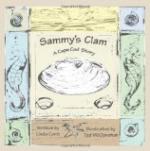“And I went away and, as the Fifth Reader used to say, ’let him alone in his glory.’
“I went back to the launch, pulled up her anchor and took her in tow. I towed her in to her pier, made her fast and then left her for a while. When I come back the little cabin-door was open and the girl’s jacket was gone.
“Then I walked up the path to the Saunders house and it done me good to see a light in Barbara’s window. I set on the steps of that house until morning keeping watch. And in the morning the yacht was gone and the weir-pole was vacant, and Cap’n Eben Saunders come on the first train.
“So’s that’s all there is of it. Allie hasn’t come back to Bayport sence, and the last I heard he’d married that Newport girl; she has my sympathy, if that’s any comfort to her.
“And Barbara? Well, for a long time she’d turn white every time I met her. But, of course, I kept my mouth shut, and she went to sea next v’yage with her dad. And now I hear she’s engaged to a nice feller up to Boston.
“Oh, yes—one thing more. When I got back to my shanty that morning I wiped the chalkmark off the door. I kind of figgered that I’d paid that debt, with back interest added.”
THE LOVE OF LOBELIA ’ANKINS
Obed’s yarn being done, and friend Davidson done too, and brown at that, Peter T. passed around another relay of cigars and we lit up. ’Twas Cap’n Eri that spoke first.
“Love’s a queer disease, anyway,” says he. “Ain’t it, now? ’Twould puzzle you and me to figger out what that Saunders girl see to like in the Davidson critter. It must be a dreadful responsible thing to be so fascinating. I never felt that responsibleness but once—except when I got married, of course—and that was a good many years ago, when I was going to sea on long v’yages, and was cruising around the East Indies, in the latitude of our new troubles, the Philippines.
“I put in about three months on one of them little coral islands off that way once. Hottest corner in the Lord’s creation, I cal’late, and the laziest and sleepiest hole ever I struck. All a feller feels like doing in them islands is just to lay on his back under a palm tree all day and eat custard-apples, and such truck.
“Way I come to be there was like this: I was fo’mast hand on a Boston hooker bound to Singapore after rice. The skipper’s name was Perkins, Malachi C. Perkins, and he was the meanest man that ever wore a sou’-wester. I’ve had the pleasure of telling him so sence—’twas in Surinam ’long in ’72. Well, anyhow, Perkins fed us on spiled salt junk and wormy hard-tack all the way out, and if a feller dast to hint that the same wa’n’t precisely what you’d call Parker House fare, why the skipper would knock him down with a marline-spike and the first mate would kick him up and down the deck. ’Twan’t a pretty performance to look at, but it beat the world for taking the craving for fancy cooking out of a man.




